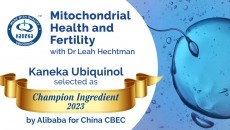More support for antioxidant reduction of AMD risk
reduce the risk of age-related macular degeneration (AMD) by a
third, suggests a new Dutch study.
"In this study, a high dietary intake of beta-carotene, vitamins C and E, and zinc was associated with a substantially reduced risk of AMD in elderly persons," wrote lead author Redmer van Leeuwen.
AMD affects the central part of the retina called the macula, which controls fine vision, leaving sufferers with only limited sight. AMD affects over 10 million people in the United States, with a further 15 to 20 million worldwide, and is the leading cause of blindness in people over 50.
The new findings, published in the 28 December issue of the Journal of the American Medical Association (vol 294, pp 3101-3107), support the Age-Related Eye Disease Study (AREDS) reported in 2001 that showed supplements containing as much as 13 times the recommended daily allowance of the same antioxidants reduced the five-year progression of early and late-stage AMD.
Unlike AREDS, however, which focused on antioxidant supplementation for people already suffering from AMD, the new study is the first to report a reduction in the risk of AMD for a diet rich in antioxidants.
The research followed more than 4,000 middle class people aged 55 or over, each of whom completed a semi quantitative food frequency questionnaire.
During the eight-year follow-up period, only 13 per cent of the sample population developed AMD. "An above-median intake of all four nutrients was associated with a 35 per cent reduced risk," reported the researchers.
A below-median consumption of all four nutrients was linked to a 20 per cent increased risk of AMD. The results were not affected by excluding supplement users.
"This study suggests that the risk of AMD can be modified by diet; in particular vitamin E and zinc... Foods high in these nutrients appear to be more important that nutritional supplements," wrote van Leeuwen.
Currently most eye supplements are based on the carotenoid lutein, while some also contain zeaxanthin.
The market has seen a slight decline in eye health supplement launches since 2003, when 30 new products were launched in the US, according to Mintel's Global New Product Database.












